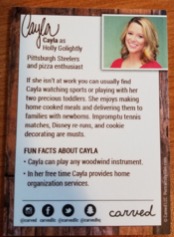
 I recently purchased a new phone, so of course, I need a new case. I’ve loved my Carved wooden phone case, so I ordered another, but this time they did something new.
I recently purchased a new phone, so of course, I need a new case. I’ve loved my Carved wooden phone case, so I ordered another, but this time they did something new.
When my new case came, it included something special. In addition to sending the standard packing and instructions, Carved included a “trading card” with information about the designer, Cayla. This created an instant impact. I was no longer a customer of some company. Cayla designed my case! After reading her bio, I liked my case even more.
That card stayed with me while we conducted a journey mapping workshop with a software company. As we talked through our recommendations, it kept coming back to me. If our client wants to create a strong relationship between their customer success team and the client, why couldn’t they do the same thing?
The card will obviously have to be customized to the brand. I don’t see our mapping teams wearing pearls and carrying the classic long cigarette, but I see this as a much stronger way to create a relationship, and it can be done without significant investment.
Most B2B support and service relationships are phone-based. The teams rarely meet in person; in most situations, you could meet your support person on the street and never even know it. There’s no real connection there.
And those connections are critical. The Temkin Group reports that when the emotional connection is solid, 76% of customers are promoters and 63% are willing to forgive you when there’s a problem, but when it’s not as strong only 6% are promoters, and only 11% will forgive you. A solid connection is required to build a positive emotional relationship. We forgive our partners when things go wrong, but we make a vendor pay.
So maybe making a card like this seems a little odd, but the worst that can happen is your customers laugh and throw it away. The best that could happen is they forgive you the next time you have a problem.
Isn’t that worth the risk of having a little fun?



![[Research Round-Up] New Study Shows the Continuing Value of B2B Thought Leadership](https://customerthink.com/wp-content/uploads/development-2010010_1280-pixabay-innovation-ideas-think-1-218x150.jpg)